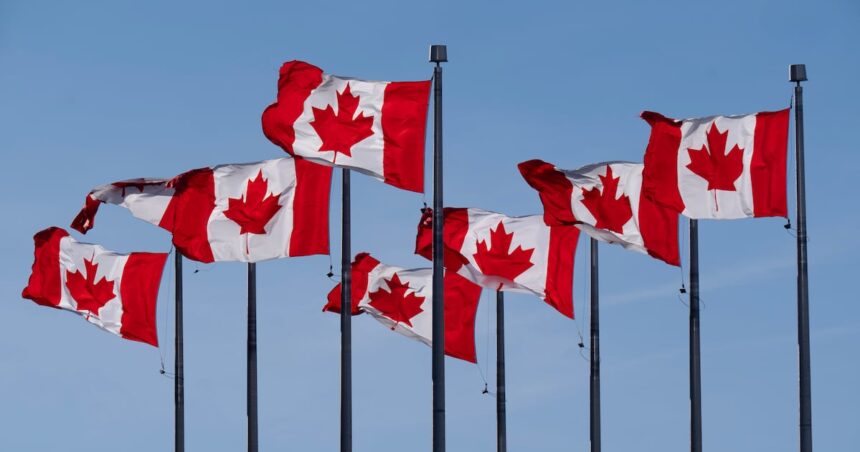I was halfway down Beach Avenue in Vancouver when I spotted him. Standing atop a stepladder in his front yard, a man in his sixties carefully mounted a Canadian flag to a freshly installed pole. It was two days before Canada Day, and his was the third new flagpole I’d noticed on my morning walk.
“It’s been sitting in my garage for three years,” he told me when I stopped to chat. “My son gave it to me during the pandemic, but I never got around to putting it up. This year feels different somehow.“
This scene is playing out across the country. According to retailers and manufacturers, flag and flagpole sales have surged dramatically ahead of Canada Day 2025, reflecting what appears to be a renewed sense of national pride.
“We’re seeing at least a 40% increase in sales compared to last year,” says Mira Patel, operations manager at Canadian Flag Depot in Toronto. “It started in May and hasn’t slowed down. We’ve had to rush-order inventory three times already.”
The trend isn’t limited to major urban centers. In Winkler, Manitoba, hardware store owner Derek Friesen says he’s sold more flagpoles in the past month than in the previous two years combined. “People aren’t just buying the flags anymore. They want the whole setup—poles, mounting brackets, solar spotlights, the works.”
This surge in visible patriotism comes at an interesting moment. Statistics Canada reported in April that national identity markers have been declining among younger Canadians for the past decade. Their survey found only 63% of Canadians aged 18-34 felt “strongly attached” to Canada, compared to 86% of those over 55.
Yet something seems to have shifted in 2025. Cultural observers point to several potential catalysts, including Canada’s recent diplomatic leadership on climate adaptation, last winter’s unexpected Olympic success in Paris, and perhaps most significantly, a desire for unity amid economic uncertainty.
“After years of polarization, people are hungry for symbols that bring us together rather than divide us,” explains Dr. Amina Chowdhury, a sociologist at the University of British Columbia who studies national identity. “The flag represents an aspirational Canada—the one we’re working toward, not necessarily the one we have today.”
In Montreal’s Parc-Extension neighborhood, I met Gabrielle Tremblay as she hung a flag from her apartment balcony. For her, the gesture is both personal and political.
“My parents came here from Haiti in the 1980s,” she says. “Canada has its problems—serious ones—but I’m still grateful for what it’s given my family. Flying the flag is complicated. It’s a reminder of what we’ve achieved and what we still need to fix.”
For Indigenous communities, the relationship with Canada Day and its symbols remains understandably complex. Last week, I spoke with Darren Hill, a Mohawk educator from Kahnawake, who described the ongoing conversation in his community.
“Some of us participate in Canada Day, others choose to observe rather than celebrate,” Hill explained. “What’s important is that more non-Indigenous Canadians are finally acknowledging this complexity. A flag can be both a symbol of pride and a prompt for reflection on whose land we’re standing on.”
Flag manufacturers have noticed another interesting trend: diversity in the types of flags being purchased. While traditional Canadian flags lead sales, provincial flags, Franco-Ontarian flags, Métis flags, and Pride-themed Canadian flags are also seeing significant increases.
“People are expressing a layered identity,” says Julian Wong, founder of FlagWorks in Vancouver. “They want to celebrate being Canadian while also honoring their specific communities.”
The economic impact of this patriotic surge extends beyond flag sales. Canada Day events are seeing record registration numbers, with festivals in major cities reporting 30-50% increases in vendor applications.
Tourism operators are also benefiting. Parks Canada reports that campground reservations for the Canada Day long weekend reached capacity in February—the earliest sellout in the agency’s history.
The Canadian Tourism Commission estimates domestic tourism will inject approximately $420 million into local economies over the holiday weekend, an 18% increase from 2024.
Not everyone sees the flag trend as entirely positive. Some political scientists worry it could signal an uncritical nationalism rather than thoughtful patriotism.
“There’s a difference between loving your country and becoming blind to its flaws,” cautions Dr. Teresa MacDonald, political science professor at Dalhousie University. “Healthy patriotism includes accountability and a commitment to making Canada better.”
Back on Beach Avenue, my neighbor on the ladder had finished securing his flag. As it caught the wind for the first time, unfurling against the backdrop of English Bay, he stepped back with visible satisfaction.
“I’ve been feeling disconnected lately,” he admitted. “Too much doom-scrolling probably. But this—” he gestured toward the flag, “this reminds me that we’re still in this together, even when it doesn’t feel like it.“
As Canada celebrates its 158th birthday, that sentiment—finding unity without erasing difference—seems to be catching on. One flag at a time.






